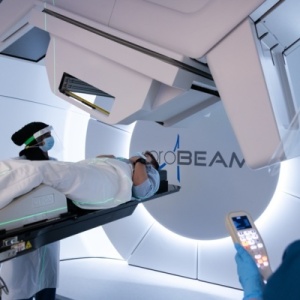UK researchers launch brain cancer study comparing proton to photon therapy
by
John R. Fischer, Senior Reporter | February 27, 2024

Scientists in the UK have launched a new trial to investigate how well proton therapy reduces side effects compared to photon radiotherapy.
To determine if proton therapy results in fewer side effects and better quality of life than standard radiotherapy, U.K. researchers have launched a countrywide trial to assess the treatment in certain brain cancer patients.
Called APPROACH (Analysis of Proton vs. Photon Radiotherapy in Oligodendroglioma and Assessment of Cognitive Health), the trial will include patients recruited from Leeds, Manchester, Oxford, London, Cambridge, and Kent with oligodendroglioma, which affects about 350,000 people annually in the U.K. Scientists at the University of Leeds Cancer Research U.K. Clinical Trials Unit, which is leading the study, will randomly assign patients to receive radiotherapy treatment or proton therapy at University College London Hospitals NHS Foundation Trust and the Christie NHS Foundation Trust in Manchester. They will then follow up with the patients over five years to evaluate their side effects, quality of life, and survival rates following treatment.
As X-rays in photon radiotherapy continue to pass through the body beyond the tumor, they continue to inflict damage, whereas protons apply a large burst of energy to the tumor with significantly less radiation hitting surrounding tissue. The purpose of the trial is to determine if this reduces side effects and with this information, personalize treatments for patients based on their individual needs.
“We really need to know if this new technique can help reduce damage to the healthy brain tissue that surrounds a tumor, so that fewer patients have their lives affected by cognitive problems, such as difficulties with memory and processing information,” said Dr. Louise Murray, Yorkshire cancer research associate professor and honorary consultant clinical oncologist at the University of Leeds’s School of Medicine.
The scientists hope the trial will also provide insights into treating other forms of cancer.
Both The Christie and UCLH are the only British treatment centers for proton therapy, which only became accessible in the U.K. for the first time in 2018. Each site is retrofitted with Varian ProBeam systems, which include 360-degree rotating gantries and beam transport systems that enable intensity-modulated proton therapy.
Brain tumor patients and their relatives worked with The Christie, UCLH, the Leeds Cancer Research U.K. Clinical Trials Unit, and the University of Leeds researchers to design the trial. The National Cancer Research Institute Clinical Trials Radiotherapy Research Working Group (CTRad), which has now closed, provided expert support and guidance to ensure the trial was efficient and of high quality.
“This will put people in the driving seat, enabling them to be copilots in their care and the decisions they make,” said Dr. Helen Bulbeck, the co-founder of U.K. brain tumor charity brainstrust, and former patient representative for proton beam therapy in CTRad.
The study is funded by the National Institute for Health and Care Research (NIHR).
Patients interested in joining are encouraged to contact their treating clinician to discuss their eligibility.
|
|
|
You Must Be Logged In To Post A Comment
|
